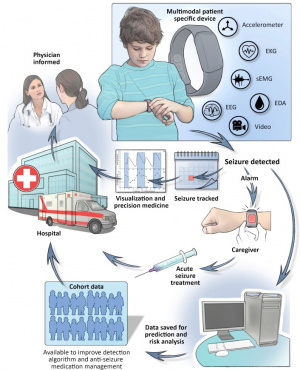Difference between revisions of "Exploring Algorithms for Early Seizure Detection"
From iis-projects
(→Status: In progress) |
|||
| Line 1: | Line 1: | ||
| − | [[Category:Digital]] [[Category:Human Intranet]] [[Category: | + | [[Category:Digital]] [[Category:Human Intranet]] [[Category:Completed]] [[Category:Master Thesis]] [[Category:2019]] |
[[Category:Herschmi]] | [[Category:Herschmi]] | ||
[[File:Non-EEG Seizure.jpg|thumb|300px]] | [[File:Non-EEG Seizure.jpg|thumb|300px]] | ||
Latest revision as of 18:47, 6 January 2020
Description
Epilepsy is a severe and prevalent chronic neurological disorder affecting 1–2% of the world’s population. One third of epilepsy patients continue to suffer from seizures despite best possible pharmacological treatment. For these patients with so-called drug-resistant epilepsy, various algorithms based on intracranial electroencephalography (iEEG) recording are proposed to detect the onset of seizures. Among them are algorithms based on brain-inspired hyperdimensional (HD) computing available at http://ieeg-swez.ethz.ch/. The main goal of this project is to enhance current HD algorithms, or propose new ones, to especially reduce the delay of seizure onset detection on long-term iEEG dataset, ultimately pushing towards early seizure detection.
Status: Completed
Anna Summerauer
- Supervision: Michael Hersche, Abbas Rahimi
Prerequisites
- Machine Learning
- Python Programming
- Cuda Programming
Character
- 40% Theory
- 60% Programming
